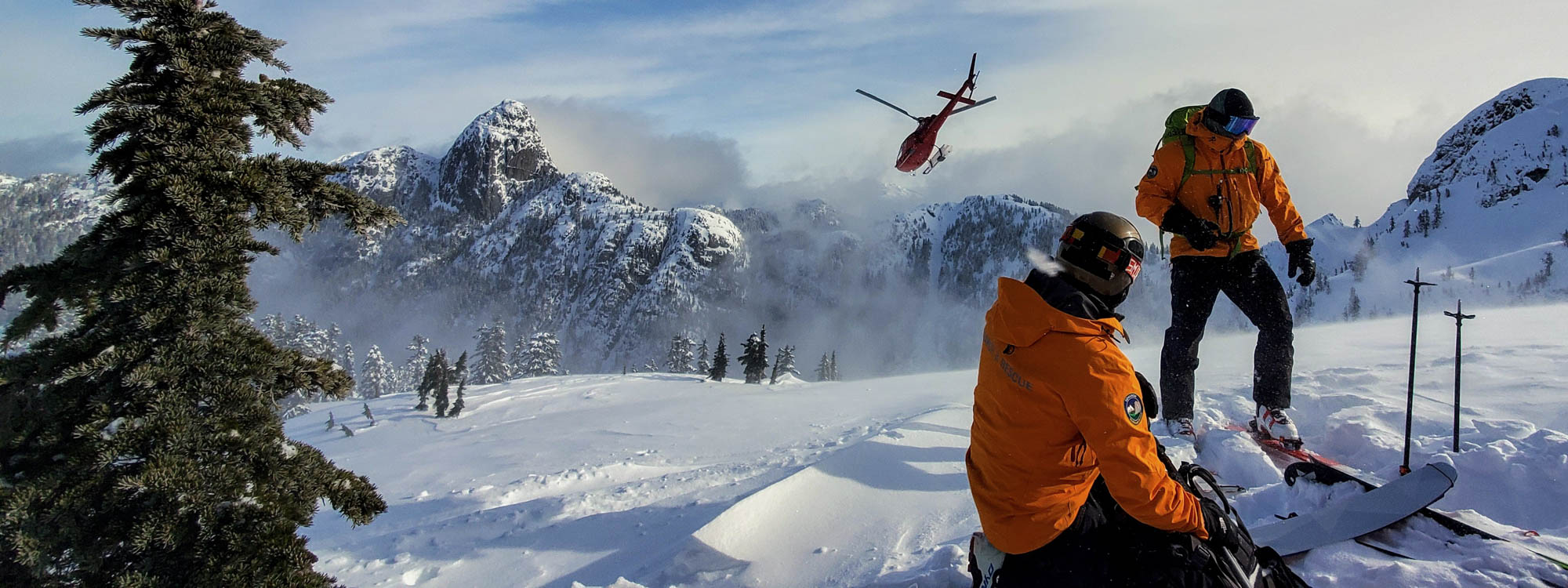When the weather gets colder and the days get shorter the calls often get more serious. The Avalanche Response Team is specially trained to handle emergencies in snowy or icy conditions and is deployed whenever a task requires a response in avalanche terrain.
Capabilities
Avalanche Team members are active GSAR members with extensive experience working and recreating in winter terrain. At a minimum, every team member will have completed a recognized Avalanche Skills Training Course, but many of our volunteers are also professional Ski Patrollers, Avalanche Technicians (CAA), Organized Avalanche Response Team Leads and experienced recreational skiers or sledders.
In addition to our boots on the ground, every call that involves our team travelling into avalanche terrain requires an Avalanche Operations Plan (AOP), a safety document created by one of our senior team members. These members take into account current and historical weather trends and data to assess the level of risk posed by potential avalanches in the response area at the time of the call.
Our team is fortunate to have access to a wide variety of gear including avalanche airbags; transceivers, probes, and shovels; snowshoes and crampons; and rescue toboggans and stretchers and can respond via helicopter, snowmobile, snowshoes and/or skis depending on the needs of situation. As such, it is imperative that every member be highly proficient in winter travel, trip planning, winter-specific first aid, companion and other winter rescue techniques (probing, digging, crevasse rescue, rope systems), and even building emergency shelters.
Did you know?
Winter can indeed be a wonderland, but when it comes to rescues in the backcountry, snow and ice provide extra challenges for search and rescue volunteers.
During the first step of any response in avalanche terrain, our senior team members are busy creating an Avalanche Operations Plan (AOP). Only once the AOP has been finalized will a SAR Manager send a team to begin travelling to the subject.
It is important to know that due to the time and effort required to create an AOP, response times in the winter will often be slower. Subjects and team members may be waiting for long periods of time, and may even include overnight stays depending on conditions at the time of the call.
Make sure you’re prepared with extra layers, food, and water in the event that a rescue is delayed!
Training
Training begins in November each year with classroom-style theory lessons every other week. Once the snow starts falling the team begins outdoor training and often receives their first call sometime in December. The rest of the winter season sees our team training outdoors whenever conditions allow and includes evening sessions, full days in the field and the occasional overnight training scenario. These training sessions are in addition to our regular, team-wide GSAR training and any advanced certifications or courses our members plan on taking.
In-field training is heavily dependent on the weather, but often sees our team venturing out to Brohm Ridge, Elfin Lakes or Red Heather. The pinnacle of winter training is usually a 2 day (overnight) trip, this year to Kees and Claire Hut, where the team can focus on putting their many skills to use. Although it sounds like a fun, group hut trip, these field trainings are also integral parts of our ability to maintain a 24/7 state of readiness.
Winter training is focused on honing a broad range of skills including:
- OAR (Organized Avalanche Response) and AvSAR (Avalanche Search and Rescue ) scenarios
- Companion rescue (probing and digging), including finding and digging out a buried transceiver in under 5 minutes
- Recco searches
- Specialized winter-specific first aid
- Patient packaging/transport in winter terrain
- Snowmobile operations
- Winter navigation and travel
- Backcountry skiing and trip planning
- Crevasse rescue
- Communications
Fundraising and Support
Squamish SAR is a non-profit organization that relies on sponsorship and donations to maintain a state of readiness and to conduct life-saving operations. Fundraising efforts for our winter team primarily go towards maintaining our two snowmobiles, purchasing and maintaining winter-specific equipment, and the costs of running team training.
Currently, we are in the process of upgrading personal kits for Avalanche Team members to include avalanche airbags, transceivers, shovels and probes. If you would like to help support the Avalanche Team, please consider making a donation.
Make a Donation
On behalf of those we have rescued, and those who have yet to be rescued, thank you!
